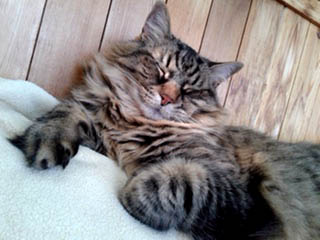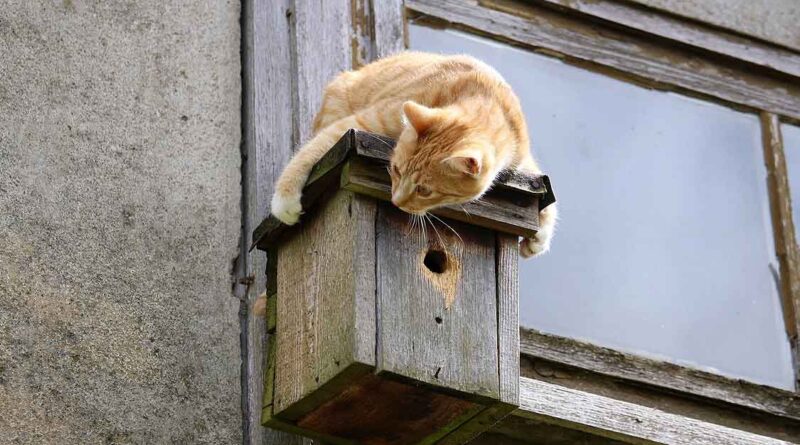Lets Reduce Predation By Cats And Dogs
By Mike Jones – Special to SUNonline/Orillia
According to Nature Canada, a Bird Friendly City is a community where key threats to birds are effectively minimised.
Although we have to accept the loss of an estimated three billion birds in Canada and the USA since 1970 was mostly due to human activity such as habitat loss and agricultural intensification, we in Orillia can partially atone and help matters in our own backyards in quite a few ways. One important way is minimising the threat to birds posed by our domestic pets, cats and dogs.
Although Orillia has a bylaw that requires dogs to be leashed while off their owner’s property unless in the two dog parks, it is not uncommon to see some owners not complying, often on Orillia trail systems. It might seem harmlessand their dogs certainly appreciate it, but dogs off leash can pose a real threat to ground-nesting birds during incubation. The same applies to your backyard in late spring when fledglings have either fallen out of the nest, or are learning to fly but have not quite got the hang of it. Please consider keeping Rover tied up during this crucial period.
According to some sources, there are about 160 million cats in Canada and the USA, approximately half of which are feral. It is this half which are responsible for the majority of cat-attributed bird deaths. Cats are intelligent and make wonderful pets and if properly looked after hardly deserve their reputation as serial bird killers. Looking after your cat means it is loved, well fed, is spayed/neutered and taken care of. Cats in this category have been shown to be far less likely to be bird killers.

Some cats are specialist hunters. A cat we once shared a home with continually caught mice and chipmunks which he never ate but proudly brought to us as gifts. We never saw him with a bird. In fact, on one occasion he came running into the house with his tail between his legs and took cover under a bed, hotly pursued by a pair of angry robins.
In addition, if cats are kept indoors, as about 46% of them are, this reduces their threat to bird life to zero, and has the additional benefit of protecting your cat from hazards like traffic, disease, poisoning, and property owners who object to cats trespassing in their garden.
Night’s darkness can bring even more deadly threats to Fluffy. If you install an infra-red game camera in your yard, you might well be surprised what shows up. Coyotes, coywolves, and coydogs are around Orillia after dark, and all will kill a cat on sight. Great horned owls are also perfectly capable of catching a kitten or small cat. I do not believe that bobcats or fishers (a large member of the weasel family which has been blamed for cat killings) are in Orillia yet, but are thriving just north of here and seem to be extending their southern range.
Feral cats have to depend on hunting to exist, and so are responsible for the great majority of birds killed by cats. Usually a colony of feral cats becomes established by domestic cats which have not been spayed or neutered and get lost, abandoned, or leave their homes as the result of abuse. These cats continue to breed. One fertile tabby is able to produce around 13 kittens per year, in three generations, her progeny will have lost their domesticity and completely reverted to a feral state.
Fortunately, there are organisations in Orillia like the Comfie Cat Shelter and a branch of the Ontario Society for the Prevention of Cruelty to Animals which should be given credit for the relatively small number of feral cats here. The Comfie Cat Shelter has a dedicated group of volunteers who gather strays and homeless cats, having them first spayed/neutered, then looked after and placed in carefully vetted homes. No cat is ever euthanized. However, the OSPCA currently is not adding to the wait list for their neutering clinics.
Finding funds for the operation of both of these organisations is an uphill battle due to the costs of vet bills (neutering can cost $400 and spaying $800) and looking after the needs of sometimes 100 sheltered cats at a time can be very expensive.
Orillia does not have a bylaw which prohibits roaming cats or require they be licensed like dogs, but for the sake of both cats and birds, it definitely would be advantageous to have one, albeit costly to enforce. So the best way for now to control feral cats is to prevent as many as possible becoming feral in the first place by keeping cats indoors, well looked after and, if it can be afforded, spayed or neutered. Orillia’s birds will thank you for that.
For more information on Bird Friendly Certification for Orillia, please contact Sustainable Orillia at jessicakearney@sustainableorillia.ca
(Images and Photos Supplied)




